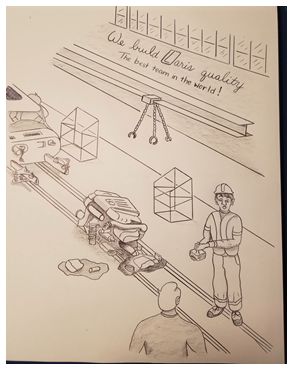Imagine working for an organization where everyone is self-reliant, where everyone is trusted to make the right decision for the organization and for themselves without having to ask for permission from their boss or to even discuss it with the boss or their associates. Is it possible?
Recently, I have been teaching people how:
- to pick strong meaningful goals
- to work out the steps, tasks, necessary to attain those goals
- monitoring themselves to see that they are staying disciplined and doing what they need to do to stay on target and
- learning how to work with a coach and to coach others
I suggested one student to pay me a small set fee for my lessons. He said, “I will have to ask the president of the hospital if he would pay it?” I told him to call a former student at a similar hospital and ask about the benefits from my instruction.” He called his counterpart at the hospital, an internal Lean consultant, who told him that they had saved one and half million dollars. With that information, he went to the CEO and asked for the necessary funds to work with me. The CEO said, “Sorry, there is no money in the budget for you.”
Ah ha, that is why we have the 9th lean waste – “Manager’s Resistance to Change.” It is easy to say “No,” for it is less threatening than “Yes,” for change might mean a problem could occur – something could go wrong with something new.
But, imagine working where you are told to make the decisions that affect your job. Mirai Industries is a middle size manufacturing company in Japan, with a little over 1000 employees that has a firm policy called “No Ho Ren So.”
Horenso is a Japanese word meaning “spinach.” Spinach is a dark green vegetable, but the word also means “something unwanted, pretentious, spurious or an untidy overgrowth.” The later definition is very appropriate to our discussion for we view allowing people to be truly self-reliant as to be unwanted or being untidy for our organizations.
- “Ho” means, “report.” Can you really tell people that they can make new decisions on their own without reporting to their boss? Of course, you trust yourself but can you really trust others to do the right thing? I received a telephone call a week ago from someone who said, “I would love to get your new book. I will ask my boss if he will allow me to buy it.” (The book cost $39.95)
- “Ren” means, “communicate.” Imagine doing something new in the company and you are told don’t even talk to others about it unless you need help.
- “So” means, “consult.” Have confidence in yourself and go ahead and do what you think is right. People hear me talk at conferences and they really like what I teach and get very excited about going back to their company and implementing it. But, of course, the boss says” “no budget, too busy, cost too much, why rock the boat, etc.”
Can you have a company with “No Horenso?”
Mirai has never lost money in any year, in the last 50 years. The president said, “Make something new – never copy what someone else manufactures.” Mirai Industry sells electric installation devices, plumbing equipment, and gas engine generation facilities among other 18,000 kinds of products, most of which have a patent. Mirai forces and fosters people to be creative, innovative, and encourages everyone to be self-reliant.
“Business will never be profitable if doing the same thing as other successful companies. Employees should make mistakes hundreds of thousands of time but should never make the same mistake twice.” - Akio Yamada, former CEO of Mirai Industry.

“Wow, a smashed Lexus engine costs around $10,000 but mistakes do happen. Just be a little bit more careful next time.”
- Artist, Dan Williams
Mirai has:
- The shortest working hours in Japan [8:30-16:45]
- Must not work overtime
- 140 holidays a year
- 3 years of maternity leave
- High salary around 7.5 million yen/year ($68,181.00) - for a common clerk at the age of 65
- Mandatory retirement at the age of 70 [65 is Japanese law]
- No layoffs
- Overseas travel for all employees every 5 years, when I visited Mirai a few years ago, everyone went to Italy
- No part-time/ temporary workers…among other things
People doing the actual work should decide who and how many to hire. How does this sound to you?


